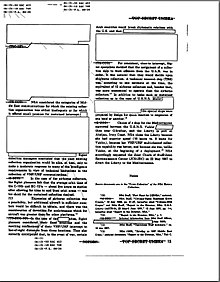A class action lawsuit, also known as a class suit,class-action, representative action, or representative action, is a type of lawsuit where one of the parties is a group of people who are represented collectively by a member or members of that group. The class action originated in the United States and is still predominantly an American phenomenon, but Canada, as well as several European countries with civil law, have made changes in recent years to allow consumer organizations to bring claims on behalf of consumers.
In legal terminology, a complaint is any formal legal document that sets out the facts and legal reasons that the filing party or parties believes are sufficient to support a claim against the party or parties against whom the claim is brought that entitles the plaintiff(s) to a remedy. For example, the Federal Rules of Civil Procedure (FRCP) that govern civil litigation in United States courts provide that a civil action is commenced with the filing or service of a pleading called a complaint. Civil court rules in states that have incorporated the Federal Rules of Civil Procedure use the same term for the same pleading.
A lawsuit is a proceeding by one or more parties against one or more parties in a civil court of law. The archaic term "suit in law" is found in only a small number of laws still in effect today. The term "lawsuit" is used with respect to a civil action brought by a plaintiff who requests a legal remedy or equitable remedy from a court. The defendant is required to respond to the plaintiff's complaint or else risk default judgment. If the plaintiff is successful, judgment is entered in favor of the defendant. A variety of court orders may be issued in connection with or as part of the judgment to enforce a right, award damages or restitution, or impose a temporary or permanent injunction to prevent an act or compel an act. A declaratory judgment may be issued to prevent future legal disputes.
In law, a settlement is a resolution between disputing parties about a legal case, reached either before or after court action begins. A collective settlement is a settlement of multiple similar legal cases. The term also has other meanings in the context of law. Structured settlements provide for future periodic payments, instead of a one time cash payment.
A subpoena duces tecum, or subpoena for production of evidence, is a court summons ordering the recipient to appear before the court and produce documents or other tangible evidence for use at a hearing or trial. In some jurisdictions, it can also be issued by legislative bodies such as county boards of supervisors.

The Alien Tort Statute, also called the Alien Tort Claims Act (ATCA), is a section in the United States Code that gives federal courts jurisdiction over lawsuits filed by foreign nationals for torts committed in violation of international law. It was first introduced by the Judiciary Act of 1789 and is one of the oldest federal laws still in effect in the U.S.

In tort law, a duty of care is a legal obligation that is imposed on an individual, requiring adherence to a standard of reasonable care to avoid careless acts that could foreseeably harm others, and lead to claim in negligence. It is the first element that must be established to proceed with an action in negligence. The claimant must be able to show a duty of care imposed by law that the defendant has breached. In turn, breaching a duty may subject an individual to liability. The duty of care may be imposed by operation of law between individuals who have no current direct relationship but eventually become related in some manner, as defined by common law.
The state secrets privilege is an evidentiary rule created by United States legal precedent. Application of the privilege results in exclusion of evidence from a legal case based solely on affidavits submitted by the government stating that court proceedings might disclose sensitive information which might endanger national security. United States v. Reynolds, which involved alleged military secrets, was the first case that saw formal recognition of the privilege.

American Civil Liberties Union v. National Security Agency, 493 F.3d 644, is a case decided July 6, 2007, in which the United States Court of Appeals for the Sixth Circuit held that the plaintiffs in the case did not have standing to bring the suit against the National Security Agency (NSA), because they could not present evidence that they were the targets of the so-called "Terrorist Surveillance Program" (TSP).
Hartman v. Moore, 547 U.S. 250 (2006), is a decision by the Supreme Court of the United States involving the pleading standard for retaliatory prosecution claims against government officials. After a successful lobbying attempt by the CEO of a manufacturing company against competing devices that the US Postal Service supported, the CEO found himself the target of an investigation by US postal inspectors and a criminal prosecution that was dismissed for lack of evidence. The CEO then filed suit against the inspectors and other government officials for seeking to prosecute him in retaliation for exercising his First Amendment rights to criticize postal policy. The Court ruled 5-2 that to prove that the prosecution was caused by a retaliatory motive, the plaintiff bringing such a claim must allege and prove that the criminal charges were brought without probable cause.
Totten v. United States, 92 U.S. 105 (1876), is a United States Supreme Court case in which the court ruled on judicial jurisdiction in espionage cases. The case was an important precursor to the court's 1953 decision in United States v. Reynolds wherein it recognized the State Secrets Privilege. The case was later referenced and its holding expanded by the Court in the 2005 case of Tenet v. Doe and then again in General Dynamics Corp. v. United States. In Tenet, which involved a contract claim against the CIA brought by Cold War era spies, Court clarified that “Totten precludes judicial review in cases. .. where success depends upon the existence of their secret espionage relationship with the government.” In General Dynamics, the Court held that the same logic applied outside the espionage context, with the limitation that “[b]oth parties—the government no less than petitioners—must have assumed the risk that state secrets would prevent the adjudication of claims of inadequate performance."
Dennis Jacobs is a senior United States circuit judge of the United States Court of Appeals for the Second Circuit.

The Whistleblower Protection Act of 1989, 5 U.S.C. 2302(b)(8)-(9), Pub.L. 101-12 as amended, is a United States federal law that protects federal whistleblowers who work for the government and report the possible existence of an activity constituting a violation of law, rules, or regulations, or mismanagement, gross waste of funds, abuse of authority or a substantial and specific danger to public health and safety. A federal agency violates the Whistleblower Protection Act if agency authorities take retaliatory personnel action against any employee or applicant because of disclosure of information by that employee or applicant.
Saudi Arabia v. Nelson, 507 U.S. 349 (1993), is a United States Supreme Court case in which the Court considered the term "based upon a commercial activity" within the meaning of the first clause of 1605(a)(2) of the Foreign Sovereign Immunities Act of 1976.
Sosa v. Alvarez-Machain, 542 U.S. 692 (2004), was a United States Supreme Court case involving the Alien Tort Statute and the Federal Tort Claims Act. Many ATS claims were filed after the Second Circuit ruling in Filártiga v. Peña-Irala created a new common law cause of action for torture under the ATS: "For purposes of civil liability, the torturer has become—like the pirate and slave trader before him—hostis humani generis, an enemy of all mankind." The Court in Sosa does not find there is a similar cause of action for arbitrary arrest and detention. They wrote that finding new common law causes of action based on international norms would require "a substantial element of discretionary judgment", and explain that the role of common law has changed since ATS was enacted meaning the Court will "look for legislative guidance before exercising innovative authority over substantive law".

The Federal Tort Claims Act ("FTCA") is a 1946 federal statute that permits private parties to sue the United States in a federal court for most torts committed by persons acting on behalf of the United States. Historically, citizens have not been able to sue the government — a doctrine referred to as sovereign immunity. The FTCA constitutes a limited waiver of sovereign immunity by the United States, permitting citizens to pursue some tort claims against the federal government. It was passed and enacted as a part of the Legislative Reorganization Act of 1946.

The Classified Information Procedures Act or CIPA is codified as the third appendix to Title 18 of the U.S. Code, the title concerning crimes and criminal procedures. The U.S. Code citation is 18 U.S.C. App. III. Sections 1-16.
The silent witness rule is the use of "substitutions" when referring to sensitive information in the United States open courtroom jury trial system. An example of a substitution method is the use of code-words on a "key card", to which witnesses and the jury would refer during the trial, but which the public would not have access to. The rule is an evidentiary doctrine that tries to balance the state secrets privilege with the bill of rights. In practice the rule has been rarely used and was often challenged by judges and civil rights advocates. Its use remains controversial.
Federal Bureau of Investigation v. Fazaga, 595 U.S. ___ (2022), was a United States Supreme Court case dealing with the use of law enforcement surveillance under the Foreign Intelligence Surveillance Act of 1978 (FISA) and the state secrets privilege defense. The case stems from a 2011 class action lawsuit filed against the Federal Bureau of Investigation (FBI) related to one of its surveillance operations. In August 2012, the district court dismissed the case on the basis of the FBI's invocation of state secrets privilege. The Ninth Circuit overturned this ruling in part in 2019, ruling that FISA precluded the defendants from invoking the state secrets defense. However, the Supreme Court overturned the Ninth Circuit’s ruling in a unanimous decision in March 2022, stating that FISA does not override the state secrets defense.
Halkin v. Helms is a landmark 1978 United States Court of Appeals for the District of Columbia Circuit case concerning the State secrets privilege.








